american values(美国的价值观)
- 格式:docx
- 大小:14.54 KB
- 文档页数:2
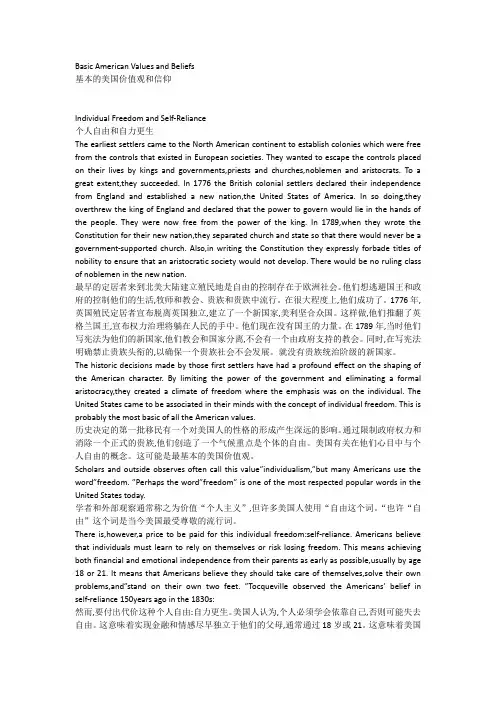
Basic American Values and Beliefs基本的美国价值观和信仰Individual Freedom and Self-Reliance个人自由和自力更生The earliest settlers came to the North American continent to establish colonies which were free from the controls that existed in European societies. They wanted to escape the controls placed on their lives by kings and governments,priests and churches,noblemen and aristocrats. To a great extent,they succeeded. In 1776 the British colonial settlers declared their independence from England and established a new nation,the United States of America. In so doing,they overthrew the king of England and declared that the power to govern would lie in the hands of the people. They were now free from the power of the king. In 1789,when they wrote the Constitution for their new nation,they separated church and state so that there would never be a government-supported church. Also,in writing the Constitution they expressly forbade titles of nobility to ensure that an aristocratic society would not develop. There would be no ruling class of noblemen in the new nation.最早的定居者来到北美大陆建立殖民地是自由的控制存在于欧洲社会。

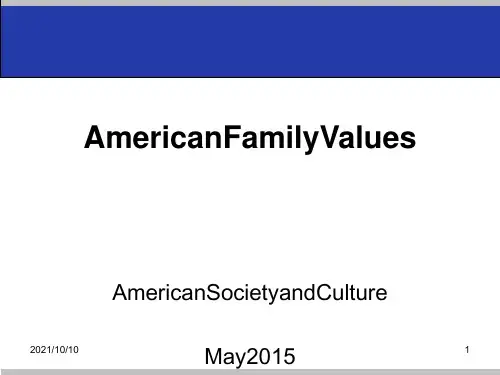
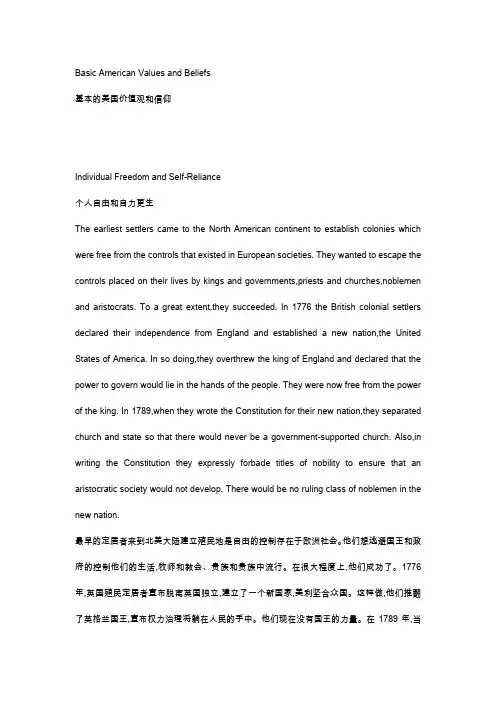
Basic American Values and Beliefs基本的美国价值观和信仰Individual Freedom and Self-Reliance个人自由和自力更生The earliest settlers came to the North American continent to establish colonies which were free from the controls that existed in European societies. They wanted to escape the controls placed on their lives by kings and governments,priests and churches,noblemen and aristocrats. To a great extent,they succeeded. In 1776 the British colonial settlers declared their independence from England and established a new nation,the United States of America. In so doing,they overthrew the king of England and declared that the power to govern would lie in the hands of the people. They were now free from the power of the king. In 1789,when they wrote the Constitution for their new nation,they separated church and state so that there would never be a government-supported church. Also,in writing the Constitution they expressly forbade titles of nobility to ensure that an aristocratic society would not develop. There would be no ruling class of noblemen in the new nation.最早的定居者来到北美大陆建立殖民地是自由的控制存在于欧洲社会。
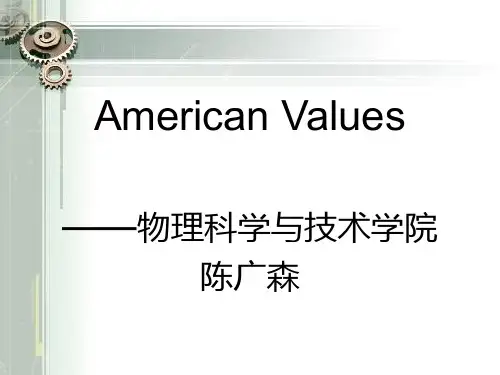

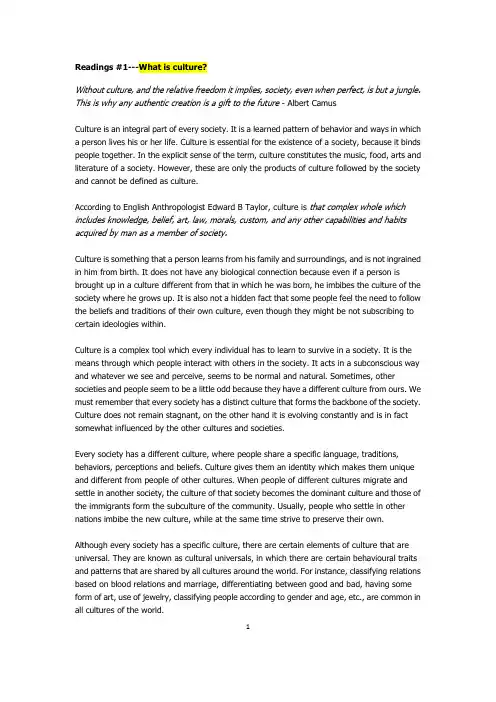
Readings #1---What is culture?Without culture, and the relative freedom it implies, society, even when perfect, is but a jungle. This is why any authentic creation is a gift to the future - Albert CamusCulture is an integral part of every society. It is a learned pattern of behavior and ways in which a person lives his or her life. Culture is essential for the existence of a society, because it binds people together. In the explicit sense of the term, culture constitutes the music, food, arts and literature of a society. However, these are only the products of culture followed by the society and cannot be defined as culture.According to English Anthropologist Edward B Taylor, culture is that complex whole which includes knowledge, belief, art, law, morals, custom, and any other capabilities and habits acquired by man as a member of society.Culture is something that a person learns from his family and surroundings, and is not ingrained in him from birth. It does not have any biological connection because even if a person is brought up in a culture different from that in which he was born, he imbibes the culture of the society where he grows up. It is also not a hidden fact that some people feel the need to follow the beliefs and traditions of their own culture, even though they might be not subscribing to certain ideologies within.Culture is a complex tool which every individual has to learn to survive in a society. It is the means through which people interact with others in the society. It acts in a subconscious way and whatever we see and perceive, seems to be normal and natural. Sometimes, other societies and people seem to be a little odd because they have a different culture from ours. We must remember that every society has a distinct culture that forms the backbone of the society. Culture does not remain stagnant, on the other hand it is evolving constantly and is in fact somewhat influenced by the other cultures and societies.Every society has a different culture, where people share a specific language, traditions, behaviors, perceptions and beliefs. Culture gives them an identity which makes them unique and different from people of other cultures. When people of different cultures migrate and settle in another society, the culture of that society becomes the dominant culture and those of the immigrants form the subculture of the community. Usually, people who settle in other nations imbibe the new culture, while at the same time strive to preserve their own.Although every society has a specific culture, there are certain elements of culture that are universal. They are known as cultural universals, in which there are certain behavioural traits and patterns that are shared by all cultures around the world. For instance, classifying relations based on blood relations and marriage, differentiating between good and bad, having some form of art, use of jewelry, classifying people according to gender and age, etc., are common in all cultures of the world.1Some people believe that humans are the only living beings who have a culture. But, there is a group of people who believe in the existence of culture even in animals. It is said that animals have certain social rules which they teach their young ones as a medium for survival.Culture is necessary to establish an order and discipline in the society. It is not only a means of communication between people, but also creates a feeling of belonging and togetherness among people in the society.By Deepa KarthaAfter you readCulture hides much more than it reveals, and strangely enough what it hides, it hides most effectively from its own participants. Years of study have convinced me that the real job is not to understand foreign culture but to understand our own.---- Edward T. HallDo you agree with the quotation by Edward T. Hall? Do people really not understand their own culture? What aspects of a country’s culture are the hardest to unde rstand?Readings #2---The Values Americans Live Byby L. Robert KohlsMost Americans would have a difficult time telling you, specifically, what the values are that Americans live by. They have never given the matter much thought.Even if Americans had considered this question, they would probably, in the end, decide not to answer in terms of a definitive list of values. The reason for this decision is itself one very American value—their belief that every individual is so unique that the same list of values could never be applied to all, or even most, of their fellow citizens.Although Americans may think of themselves as being more varied and unpredictable than they actually are, it is significant that they think they are. Americans tend to think they have been only slightly influenced by family, church or schools. In the end, each believes, "I personally chose which values I want to live my own life by."Despite this self-evaluation, a foreign anthropologist could observe Americans and produce a list of common values that would fit most Americans. The list of typically American values would stand in sharp contrast to the values commonly held by the people of many other countries. We, the staff of the Washington International Center, have been introducing thousands of international visitors to life in the United States for more than a third of a century. This has caused us to try to look at Americans through the eyes of our visitors. We feel confident that the values listed here describe most (but not all) Americans.Furthermore, we can say that if the foreign visitor really understood how deeply ingrained these 13 values are in Americans, he or she would then be able to understand 95% of American actions—action that might otherwise appear strange or unbelievable when evaluated from the2perspective of the foreigner’s own society and its values.The different behaviors of a people or a culture make sense only when seen through the basic beliefs, assumptions and values of that particular group. When you encounter an action, or hear a statement in the United States that surprises you, try to see it as an expression of one or more of the values listed here. For example, when you ask Americans for directions to get to a particular address in their own city, they may explain, in great detail, how you can get there on your own, but may never even consider walking two city blocks with you to lead you to the place. Some foreign visitors have interpreted this sort of action as showing Americans’ "unfriendliness." We would suggest, instead, that the self-help concept (value number 6 on our list), is so strong in Americans that they firmly believe that no adult would ever want, even temporarily, to be dependent on another. Also, their future orientation (value 8) makes Americans think it is better to prepare you to find other addresses on your own in the future. Before proceeding to the list itself, we should also point out that Americans see all of these values as very positive ones. They are not aware, for example, that the people in many Third World countries view change (value 2) as negative or threatening. In fact, all 13 of these American values are judged by many of the word’s citizens as negative and undesirable. Therefore, it is not enough simply to familiarize yourself with these values. You must also, so far as possible, consider them without the negative or derogatory connotation that they might have for you, based on your own experience and cultural identity.It is important to state emphatically that our purpose in providing you with this list of the most important American values is not to convert you, the foreign visitor, to our values. We couldn’t achieve that goal even if we wanted to, and we don’t want to. We simply want to help you understand the Americans with whom you will be relating—from their own value system rather that from yours.1. PERSONAL CONTROL OVER THE ENVIRONMENTAmericans no longer believe in the power of Fate, and they have come to look at people who do as being backward, primitive, or hopelessly naïve. To be call "fatalistic" is one of the worst criticisms one can receive in the American context; to an American, it means one is superstitious and lazy, unwilling to take any initiative in bringing about improvement.In the United States, people consider it normal and right that Man should control Nature, rather than the other way around. More specifically, people believe every single individual should have control over whatever in the environment might potentially affect him or her. The problems of one’s life are not seen as having resulted from bad luck as much as having come from one’s laziness in pursuing a better life. Furthermore, it is considered normal that anyone should look out for his or her own self-interests first and foremost.Most Americans find it impossible to accept that there are some things that lie beyond the power of humans to achieve. And Americans have literally gone to the moon, because they refused to accept earthly limitations.Americans seem to be challenged, even compelled, to do, by one means or another (and often at great cost) what seven-eighths of the world is certain cannot be done.32. CHANGEIn the American mind, change is seen as an indisputably good condition. Change is strongly linked to development, improvement, progress, and growth. Many older, more traditional cultures consider change as a disruptive, destructive force, to be avoided if at all possible. Instead of change, such societies value stability, continuity, tradition, and a rich and ancient heritage—none of which are valued very much in the United States.These first two values—the belief that we can do anything and the belief that any change is good—together with an American belief in the virtue of hard work and the belief that each individual has a responsibility to do the best he or she can do have helped Americans achieve some great accomplishments. So whether these beliefs are true is really irrelevant; what is important is that Americans have considered them to be true and have acted as if they were, thus, in effect, causing them to happen.3. TIME AND ITS CONTROLTime is, for the average American, of utmost importance. To the foreign visitor, Americans seem to be more concerned with getting things accomplished on time (according to a predetermined schedule) than they are with developing deep interpersonal relations. Schedules, for the American, are meant to be planned and then followed in the smallest detail.It may seem to you that most Americans are completely controlled by the little machines they wear on their wrists, cutting their discussions off abruptly to make it to their next appointment on time.Americans’ language is filled with references to time, giving a clear indication of how much it is valued. Time is something to be "on," to be "kept," "filled," "saved," "used," "spent," "wasted," "lost," "gained," "planned," "given," "made the most of," even "killed."The international visitor soon learns that it is considered very rude to be late—even by 10 minutes—for an appointment in the United States. (Whenever it is absolutely impossible to be on time, you should phone ahead and tell the person you have been unavoidably detained and will be a half hour—or whatever—late.)Time is so valued in America, because by considering time to be important one can clearly accomplish more that if one "wastes" time and does not keep busy. This philosophy has proven its worth. It has enabled Americans to be extremely productive, and productivity itself is highly valued in the United States. Many American proverbs stress the value in guarding our time, using it wisely, setting and working toward specific goals, and even expending our time and energy today so that the fruits of our labor may be enjoyed at a later time. (This latter concept is called "delayed gratification.")4. EQUALITY/EGALITARIANISMEquality is, for Americans, one of their most cherished values. This concept is so important for Americans that they have even given it a religious basis. They say all people have been "created equal." Most Americans believe that God views all humans alike without regard to intelligence, physical condition or economic status. In secular terms this belief is translated into the assertion that all people have an equal opportunity to succeed in life. Americans differ in opinion about how to make this ideal into a reality. Yet virtually all agree that equality is an4important civic and social goal.The equality concept often makes Americans seem strange to foreign visitors. Seven-eighths of the world feels quite differently. To them, rank and status and authority are seen as much more desirable considerations—even if they personally happen to find themselves near the bottom of the social order. Class and authority seem to give people in those other societies a sense of security and certainty. People outside the United States consider it reassuring to know, from birth, who they are and where they fit into the complex system called "society".Many highly-placed foreign visitors to the United States are insulted by the way they are treated by service personnel (such as waiters in restaurants, clerks in stores, taxi drivers, etc.). Americans have an aversion to treating people of high position in a deferential manner, and, conversely often treat lower class people as if they were very important. Newcomers to the United States should realize that no insult or personal indignity is intended by this lack of deference to rank or position in society. A foreigner should be prepared to be considered "just like anybody else" while in the country.5. INDIVIDUAL AND PRIVACYThe individualism that has been developed in the Western world since the Renaissance, beginning in the late 15th century, has taken its most exaggerated form in 20th century United States. Here, each individual is seen as completely and marvelously unique, that is, totally different from all other individuals and, therefore, particularly precious and wonderful. Americans think they are more individualist in their thoughts and actions than, in fact, they are. They resist being thought of as representatives of a homogenous group, whatever the group. They may, and do, join groups—in fact many groups—but somehow believe they’re just a little different, just a little unique, just a little special, from other members of the same group. And they tend to leave groups as easily as they enter them.Privacy, the ultimate result of individualism is perhaps even more difficult for the foreigner to comprehend. The word "privacy" does not even exist in many languages. If it does, it is likely to have a strongly negative connotation, suggesting loneliness or isolation from the group. In the United States, privacy is not only seen as a very positive condition, but it is also viewed as a requirement that all humans would find equally necessary, desirable and satisfying. It is not uncommon for Americans to say—and believe—such statements as "If I don’t have at least half an hour a day to myself, I will go stark raving mad."Individualism, as it exists in the United States, does mean that you will find a much greater variety of opinions (along with the absolute freedom to express them anywhere and anytime) here. Yet, in spite of this wide range of personal opinion, almost all Americans will ultimately vote for one of the two major political parties. That is what was meant by the statement made earlier that Americans take pride in crediting themselves with claiming more individualism than, in fact, they really have.6. SELF-HELP CONTROLIn the United States, a person can take credit only for what he or she has accomplished by himself or herself. Americans get no credit whatsoever for having been born into a rich family. (In the United States, that would be considered "an accident of birth.") Americans pride5themselves in having been born poor and, through their own sacrifice and hard work, having climbed the difficult ladder of success to whatever level they have achieved—all by themselves. The American social system has, of course, made it possible for Americans to move, relatively easily, up the social ladder.Take a look in an English-language dictionary at the composite words that have "self" as a prefix. In the average desk dictionary, there will be more than 100 such words, words like self-confidence, self-conscious, self-control, self-criticism, self-deception, self-defeating,self-denial, self-discipline, self-esteem, self-expression, self-importance, self-improvement, self-interest, self-reliance, self-respect, self-restraint, self-sacrifice—the list goes on and on. The equivalent of these words cannot be found in most other languages. The list is perhaps the best indication of how seriously Americans take doing things for one’s self. The "self-made man or women" is still very much the ideal in 20th-century America.7. COMPETITION AND FREE ENTERPRISEAmericans believe that competition brings out the best in any individual. They assert that it challenges or forces each person to produce the very best that is humanly possible. Consequently, the foreign visitor will see competition being fostered in the American home and in the American classroom, even on the youngest age level. Very young children, for instance, are encouraged to answer questions for which their classmates do not know the answer. You may find the competitive value disagreeable, especially if you come from a society that promotes cooperation rather than competition. But many U.S. Peace Corps volunteers teaching in Third World countries found the lack of competitiveness in a classroom situation equally distressing. They soon learned that what they thought to be one of the universal human characteristics represented only a peculiarly American (or Western) value.Americans, valuing competition, have devised an economic system to go with it—free enterprise. Americans feel strongly that a highly competitive economy will bring out the best in its people and, ultimately, that the society that fosters competition will progress most rapidly. If you look for it, you will see evidence in all areas—even in fields as diverse as medicine, the arts, education, and sports—that free enterprise is the approach most often preferred in America.8. FUTURE ORIENTATIONValuing the future and the improvements Americans are sure the future will bring means that they devalue that past and are, to a large extent, unconscious of the present. Even a happy present goes largely unnoticed because, happy as it may be, Americans have traditionally been hopeful that the future would bring even greater happiness. Almost all energy is directed toward realizing that better future. At best, the present condition is seen as preparatory to a latter and greater event, which will eventually culminate in something even more worthwhile. Since Americans have been taught (in value 1) to believe that Man, and not Fate, can and should be the one who controls the environment, this has made them very good at planning and executing short-term projects. This ability, in turn, has caused Americans to be invited to all corners of the earth to plan and achieve the miracles that their goal-setting can produce. If you come from a culture such as those in the traditional Moslem world, where talking about or actively planning the future is felt to be a futile, even sinful, activity, you will have not6only philosophical problems with this very American characteristic but religious objections as well. Yet it is something you will have to learn to live with, for all around you Americans will be looking toward the future and what it will bring.9. ACTION/WORK ORIENTATION"Don’t just stand there," goes a typical bit of American advice, "do something!" This expression is normally used in a crisis situation, yet, in a sense, it describes most American’s entire waking life, where action—any action—is seen to be superior to inaction.Americans routinely plan and schedule an extremely active day. Any relaxation must be limited in time, pre-planned, and aimed at "recreating" their ability to work harder and more productively once the recreation is over. Americans believe leisure activities should assume a relatively small portion of one’s total life. People think that it is "sinful" to "waste one’s time," "to sit around doing nothing," or just to "daydream."Such a "no nonsense" attitude toward life has created many people who have come to be known as "workaholics," or people who are addicted to their work, who think constantly about their jobs and who are frustrated if they are kept away from them, even during their evening hours and weekends.The workaholic syndrome, in turn, causes Americans to identify themselves wholly with their professions. The first question one American will ask another American when meeting for the first time is related to his or her work: "Where do you work?," or "Who (what company) are you with?"And when such a person finally goes on vacation, even the vacation will be carefully planned, very busy and active.America may be one of the few countries in the world where it seems reasonable to speak about the "dignity of human labor," meaning by that, hard, physical labor. In America, even corporation presidents will engage in physical labor from time to time and gain, rather than lose, respect from others for such action.10. INFORMALITYIf you come from a more formal society, you will likely find Americans to be extremely informal, and will probably feel that they are even disrespectful of those in authority. Americans are one of the most informal and casual people in the world, even when compared to their near relative—the Western European.As one example of this informality, American bosses often urge their employees to call them by their first names and even feel uncomfortable if they are called by the title "Mr." or "Mrs." Dress is another area where American informality will be most noticeable, perhaps even shocking. One can go to a symphony performance, for example, in any large American city nowadays and find some people in the audience dressed in blue jeans and tieless,short-sleeved shirts.Informality is also apparent in American’s greetings. The more formal "How are you?" has largely been replaced with an informal "Hi." This is as likely to be used to one’s superior as to one’s best friend.If you are a highly placed official in your own country, you will probably, at first, find such7informality to be very unsettling. American, on the other hand, would consider such informality as a compliment! Certainly it is not intended as an insult and should not be taken as such.11. DIRECTNESS, OPENNESS AND HONESTYMany other countries have developed subtle, sometimes highly ritualistic, ways of informing other people of unpleasant information. Americans, however, have always preferred the first approach. They are likely to be completely honest in delivering their negative evaluations. If you come from a society that uses the indirect manner of conveying bad news or uncomplimentary evaluations, you will be shocked at Americans’ bluntness.If you come from a country where saving face is important, be assured that Americans are not trying to make you lose face with their directness. It is important to realize that an American would not, in such case, lose face. The burden of adjustment, in all cases while you are in this country, will be on you. There is no way to soften the blow of such directness and openness if you are not used to it except to tell you that the rules have changed while you are here. Indeed, Americans are trying to urge their fellow countrymen to become even more open and direct. The large number of "assertiveness" training courses that appeared in the United States in the late 1970s reflects such a commitment.Americans consider anything other than the most direct and open approach to be dishonest and insincere and will quickly lose confidence in and distrust anyone who hints at what is intended rather than saying it outright.Anyone who, in the United States, chooses to use an intermediary to deliver that message will also be considered manipulative and untrustworthy.12. PRACTICALITY AND EFFICIENCYAmericans have a reputation of being an extremely realistic, practical and efficient people. The practical consideration is likely to be given highest priority in making any important decision in the United States. Americans pride themselves in not being very philosophically or theoretically oriented. If Americans would even admit to having a philosophy, it would probably be that of pragmatism.Will it make any money? Will it "pay its own way?" What can I gain from this activity? These are the kinds of questions that Americans are likely to ask in their practical pursuit, not such questions as: Is it aesthetically pleasing? Will it be enjoyable?, or Will it advance the cause of knowledge?This practical, pragmatic orientation has caused Americans to contribute more inventions to the world than any other country in human history. The love of "practicality" has also caused Americans to view some professions more favorably than others. Management and economics, for example, are much more popular in the United States than philosophy or anthropology, law and medicine more valued than the arts.Another way in which this favoring of the practical makes itself felt in the United States, is a belittling of "emotional" and "subjective" evaluations in favor of "rational" and "objective" assessments. Americans try to avoid being too sentimental in making their decisions. They judge every situation "on its merits." The popular American "trail-and-error" approach to problem solving also reflects the practical. The approach suggests listing several possible8solutions to any given problem, then trying them out, one-by-one, to see which is most effective.13. MATERIALISM/ACQUISITIVENESSForeigners generally consider Americans much more materialistic than Americans are likely to consider themselves. Americans would like to think that their material objects are just the natural benefits that always result from hard work and serious intent—a reward, they think, that all people could enjoy were they as industrious and hard-working as Americans.But by any standard, Americans are materialistic. This means that they value and collect more material objects than most people would ever dream of owning. It also means they give higher priority to obtaining, maintaining and protecting their material objects than they do in developing and enjoying interpersonal relationships.The modern American typically owns:∙one or more color television sets,∙an electric hair dryer,∙an electronic calculator,∙a tape recorder and a record player,∙a clothes-washer and dryer,∙a vacuum cleaner,∙a powered lawn mower (for cutting grass),∙a refrigerator, a stove, and a dishwasher,∙one or more automobiles,∙and a telephone. Many also own a personal computer.Since Americans value newness and innovation, they sell or throw away their possessions frequently and replace them with newer ones. A car may be kept for only two or three years, a house for five or six before trading it in for another one.SUMMARYNow that we have discussed each of these 13 values separately, if all too briefly, let us look at them in list form (on the left) and then consider them paired with the counterpart values from a more traditional country (on the right):9。
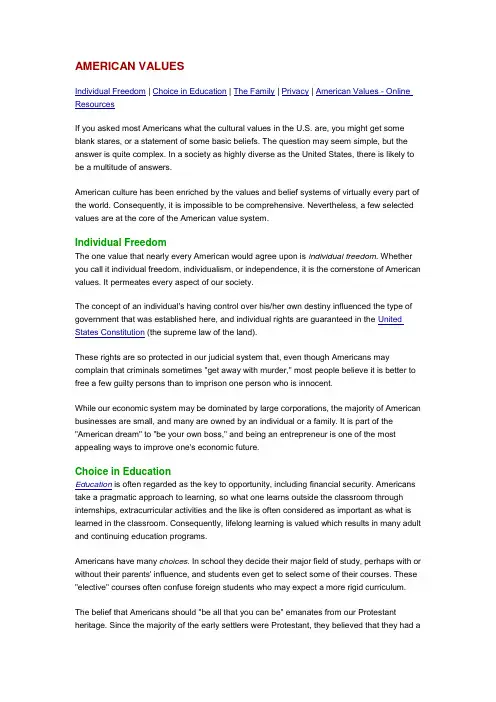
AMERICAN VALUESIndividual Freedom | Choice in Education | The Family | Privacy | American Values - Online ResourcesIf you asked most Americans what the cultural values in the U.S. are, you might get some blank stares, or a statement of some basic beliefs. The question may seem simple, but the answer is quite complex. In a society as highly diverse as the United States, there is likely to be a multitude of answers.American culture has been enriched by the values and belief systems of virtually every part of the world. Consequently, it is impossible to be comprehensive. Nevertheless, a few selected values are at the core of the American value system.Individual FreedomThe one value that nearly every American would agree upon is individual freedom. Whether you call it individual freedom, individualism, or independence, it is the cornerstone of American values. It permeates every aspect of our society.The concept of an individual's having control over his/her own destiny influenced the type of government that was established here, and individual rights are guaranteed in the United States Constitution (the supreme law of the land).These rights are so protected in our judicial system that, even though Americans may complain that criminals sometimes "get away with murder," most people believe it is better to free a few guilty persons than to imprison one person who is innocent.While our economic system may be dominated by large corporations, the majority of American businesses are small, and many are owned by an individual or a family. It is part of the "American dream" to "be your own boss," and being an entrepreneur is one of the most appealing ways to improve one's economic future.Choice in EducationEducation is often regarded as the key to opportunity, including financial security. Americans take a pragmatic approach to learning, so what one learns outside the classroom through internships, extracurricular activities and the like is often considered as important as what is learned in the classroom. Consequently, lifelong learning is valued which results in many adult and continuing education programs.Americans have many choices. In school they decide their major field of study, perhaps with or without their parents' influence, and students even get to select some of their courses. These "elective" courses often confuse foreign students who may expect a more rigid curriculum.The belief that Americans should "be all that you can be" emanates from our Protestant heritage. Since the majority of the early settlers were Protestant, they believed that they had aresponsibility to improve themselves, to be the best they could be, to develop their talents, and to help their neighbors. These convictions have not only influenced our educational system, but are often reflected in U.S. foreign policy. What some might consider meddling in other people's affairs, others believe is fulfilling a moral obligation.The FamilyAnother aspect of American society that may bewilder non-Americans is the family. The nuclear family structure (parents and children) is so alien to most cultures in the world that it is often misunderstood. The main purpose of the American family is to bring about the happiness of each individual family member. The traditional family values include love and respect for parents, as well as for all members of the family.However, the emphasis on the individual and his/her right to happiness can be confusing. It allows children to disagree, even argue with their parents. While in most other cultures such action would be a sign of disrespect and a lack of love, that is not the case in the United States. It is simply a part of developing one's independence.Many foreign students and visitors are welcomed by host families, who invite them into their homes for dinner or to join in family activities. Frequently visitors are told to "make themselves at home" and, at times, may appear to be "left alone."It certainly is nice to be treated as an honored guest in someone's home, but one of the highest compliments that an American can give foreign guests is to treat them like members of the family, which means to give them the "freedom of the house" to do what they want, to "raid the refrigerator" on their own, or to have some quiet time alone.PrivacyPrivacy is also important to Americans. The notion of individual privacy may make it difficult to make friends. Because Americans respect one's privacy, they may not go much beyond a friendly "hello." Ironically, it is usually the foreigner who must be more assertive if a friendship is to develop.The rugged individualism valued by most Americans stems from our frontier heritage. For much of our country's history, there was a frontier. That experience greatly influenced American attitudes. Early settlers had to be self-sufficient which forced them to be inventive. Their success gave them an optimism about the future, a belief that problems could be solved. This positive spirit enables Americans to take risks in areas where others might only dream, resulting in tremendous advances in technology, health and science.The American frontier also created our heroes: the self-reliant, strong-willed, confident individual who preferred action to words and always tried to treat others fairly. Many of these characteristics are represented by the myth of the American cowboy, and the more modern versions personified in movies by John Wayne, Clint Eastwood, and Sylvester Stallone. We can even look to "future" centuries and admire similar qualities in the heroes of the Star Trek and Star Wars movie series.In addition to such basic American values as individual freedom, self-reliance, equality of opportunity, hard work, material wealth, and competition, we see a trend toward conservation with an emphasis on recycling and preserving the environment. Also there is a greatersensitivity to cooperation on a more global scale.No matter what changes the next century brings or whether you agree with American values, the opportunity to visit the United States and to observe Americans first-hand is an experience well worth the effort.Be careful not to be ethnocentric, but to evaluate a culture by its own standards. Be aware that you'll help shape American attitudes, just as they will influence you.About American ValuesAmerican Values is a non-profit organization committed to uniting the American people around the vision of our Founding Fathers. Centuries ago, our Founders boldly proclaimed to the world a distinctly American faith in democracy; a faith rooted in the self-evident truths that "all men are created equal and endowed by their Creator with certain unalienable rights, that among these are life, liberty and th e pursuit of happiness." We believe these liberties need to be uph eld and cherished, especially given how closely divided our country seems.American Values serves to remind the public of the conservative principles that are so fundamental to the survival of our nation and to b ring support and ideas to policy makers and empower our elected officials to have the support they need to d o what is right, noble and good.Our vision is a nation that embraces life, marriage, family, faith, and freedom. We work for streets without bullets, schools that p repare our children for success, laws that protect our people and a government that serves its citizens. We can get there. But we n eed to start now.Sadly, the culture of death continues to be promoted in our media, courts and legislatures. Millions of unborn children have been killed over the last 30 years as a result of our country’s selfishness, justified under the euphemisms of choice and privacy. Advances in science h ave brought about new challenges for those working to protect life. Embryonic stem cell research and cloning advocates borrow fro m the pro-abortion playbook by trying to confuse the public about the supposed benefits and dangerous realities of their research.American Values is deeply committed to defending life, traditional marriage and equipping our children with the values n ecessary to stand against liberal education and cultural forces. American Values is an endeavor that we hope will continue to strengthen the distinct Am erica that our Founding Fathers sought to create. And we hop e that you will join me in this effort.American Value: Equality∙Level:∙Grades 6 to 8∙Grades 9 to 12∙Subject:∙Reading and Language Arts∙Social StudiesAcross the political spectrum, most commentators identify "equality" as an Americanvalue. After all, the Constitution begins "We the People of the United States, in Order to forma more perfect Union" — a pronouncement that implies a group of individuals coming togetherto speak with equal voice and authority.In 1787, "People" really only meant "Free Persons," and "Free Persons" meant white m en.African Americans who were enslaved were deemed "other Persons," which, after muchdebate, the authors of the Constitution ultimately deemed "three-fifths" of a Free Person as a means to bolster Southern representation in Congress. And, at the time, white women were considered the property of their husbands and certainly unfit for public duty.Fortunately, our Constitution created a system of government that was bigger than theprivileged white men who wrote it, allowing our nation to correct its limited view of humanity through Constitutional amendments and other means.Help students examine this transformation by reading an original version of the Constitution;we suggest the National Archives' version, which highlights in red where changes ultimately were made. As students read the document, ask them to identify the following:∙In Article I, Section 2, what pronoun is used to refer to a "Representative"? To whom does "all other Persons" refer?∙In Article I, Section 3, what pronoun is used to refer to a "Senator"?∙In Article I, Section 7, and in Article II, Sections 1, 2 and 3, what pronouns are used to refer to the "President"?∙In Article IV, Section 2, what pronoun is used to refer to a person? To whom does "Person held to service or labor" refer?Next, introduce students to key Amendments that have expanded the meaning of "We":Amendments XIII, XIV and XV (abolishing slavery and guaranteeing African Americans equal protections under the law, ratified after the Civil War; the Amendments' promise wasn'tenforced, however, until the passage of the Civil Rights Act of 1964 and the Voting Rights Act of 1965), Amendment XIX (granting women the right to vote, ratified as a result of the suffrage movement) and Amendment XXIV (abolishing poll taxes that had been used to keep African Americans from voting, ratified as a result of the Civil Rights Movement).To close the activity, ask students to reflect verbally or in writing on how these Amendments have helped the U.S. become a "more perfect Union, establish Justice, [and] insure domestic Tranquility."Build on this lesson with the following activities:∙This summer, in a decision related to school integration, some members of the Supreme Court argued that our Constitution is "color-blind." Ask students to write an argumentative essayagreeing or disagreeing with this viewpoint.∙The field of contenders for the 2008 Presidential elections has been widely lauded for its diversity.Comedian Jon Stewart went so far as to ask Democratic contender John Edwards if he feltdisadvantaged as a white man. Using the Washington Post's listing of candidates, identify the sex, race and ethnicity of each candidate and then contrast "candidate demographics" againstdemographics of the U.S. population generally, using this chart. Which racial, ethnic and gender groups are over- or under-represented? How might these discrepancies relate to patterns ofinclusion and exclusion in "We" over time? What do they tell us about equality of access to our nation's political system?∙Echoing the language of the Fifteenth Amendment, the not-yet-ratified Equal Rights Amendment (ERA) declares, "Equality of rights under the law shall not be denied or abridged by the United States or by any State on account of sex." Students can explore the debate about the ERA, as well as the process by which our Constitution is amended, at CNN's Student News division.∙The Constitution mentions "Indians" twice — treating them as members of "non-taxed" (and thus non-represented) tribes with whom the federal government holds negotiation rights. The Indian Citizenship Act of 1924 — legislative action, not an amendment — extended citizenship to Native Americans. Full enforcement of the Act was long and arduous, however; as late as 1989, forexample, the state of Montana was prohibiting tribal members from voting. How can American Indians be members of sovereign tribes and citizens of the U.S., with which tribes maintaintreaties? Engage in a classroom research project to discover the necessity — and development —of both treaties between these nation-states and the enfranchisement of Native Americans. A good place to begin is Native Vote: American Indians, the Voting Rights Act, and the Right to Vote by Daniel McCool, Susan M. Olson and Jennifer L. Robinson ($24.99, ISBN-10: 0521548713;ISBN-13: 978-0521548717).∙美国人的价值观∙∙∙2006-4-5 10:01:46 心情:? 天气:? 温度:? ℃∙∙记得1998年我参加过一项美国人对中国人价值观和美国人价值观的调查和对比(美国英语学会主办),他们让你说出你自己人生当中最看重的,然后再按照大家所说的几率排出中国人最看重的前十项,也就是中国人的价值观展示。

美国价值观与观念随着们的成长,他们从他们的父母和其他亲戚,他们的老师,书籍,报纸,电视节目,互联网,以及各种其他来源学习某些价值和假设。
价值观和假设是紧密相关的,但它们之间存在着一定的差异。
在不同文化的方法中,男人和女人的角色的适当的角色提供了一个很好的例子,价值观和假设之间的关系。
价值观是对什么是正确和错误,可取和不可取的,正常和不正常,适当和不适当的想法。
例如,在某些文化中,人们教导人们应该在不同的社会世界中单独的社会世界,在男人的领域中有明确的活动,在其他文化中,男人和女人都被认为有更多或更少的平等参与社会中的角色。
观念,用在这里,是观念,是关于人的,生活的给予,,而事情的方式。
例如,在某些社会中,人们认为家庭生活是和谐的,当女人在家里和孩子们呆在家里时,他们会在家里赚钱。
在其他社会,人们认为家庭生活是最好的,当外界工作和抚养孩子的责任是由男人和女人共同分享的。
在一些社会中,人们认为当一个成熟的男人和女人单独在一起,性活动几乎肯定会发生。
在其他国家,柏拉图(即,性元素缺乏)未婚男女之间的友谊是可能的。
学者争论的定义,价值观,假设,和其他条款,出现在这本书。
但这本书不是为学者。
希望对美国有一定了解的国际游客。
那些想读更多学术著作的人在这里提出的问题可以参考书目的最后这本书。
在特定的文化中成长的人有一定的价值观和假设。
这并不意味着他们都在相同的程度上分享相同的价值观。
这确实意味着他们中的大多数,大部分时间,都同意对方的想法,对什么是正确的和错误的,可取的和不可取的,等等。
他们也同意,主要是,与彼此的假设有关的人性,社会关系,等等。
任何价值观和假设的任何一列都是天生的武断的。
这取决于如何定义和分类的东西,可以使一三项或一三零项国家的重大价值和假设清单。
下面提供的名单有八项,涵盖一系列的密切相关的价值观和美国人普遍持有的假设:个人主义,自由,竞争,和隐私;平等;非正式;未来,改变,进步;人性的善良;时间;成就,行动,工作,和唯物主义;而直接和自信。

美式价值观美式价值观是指美国文化中的价值观念,它基于一些社会、宗教和政治的基本原则,使美国成为一个崇尚自由、平等、私有制、服务公众利益的国家。
美国的价值观由美国人从美国创造主义、英国议会制民主、法国大革命仅以及美国革命等一系列事件中发展而来。
美国价值观的主要支柱包括自由、民主、公正、平等与尊重他人。
自由是美式价值观中最重要的一个要素,它所反映的是美国历史上最经典的自由精神,尽管在不同的历史时期可能有不同的表现形式,但其核心思想仍然是要让人们免受官僚主义的束缚,以自由的精神追求公平,尊重个人自由和尊严,权利及其他有利于个人发展和财富分配的斗争以克服旧有压迫性政权和令人不满的待遇。
民主是美国价值观的另一要素。
它指的是在政治上,人民可以通过选举表达自己的意志,并作为民主的一部分获得有效的代表权。
此外,在经济领域,民主意味着经济发展也应该符合公众利益和公平原则,反映美国崇尚的社会公正的理念。
公正是另一个重要的美式价值观,它表达了美国社会对公平待遇和打击不公正的态度。
它坚持认为在社会上,任何人都应该得到同等对待和平等机会,这也体现在美国法律和政府政策中所规定的,管理公共机构的原则之上。
此外,公正还意味着社会中的一切结果都应该基于公正的准则,而不是个人的偏见。
平等与尊重他人也是美式价值观的一部分,它源于美国最初的宪法中规定的“人人平等”原则,主张所有人都应该受到同等的尊重和平等对待,而不受他人的歧视。
此外,尊重他人还意味着尊重他人的人格和权利,避免过度干涉他人,坚持道德规范和社会公平原则,勇于承担责任,分享收益,崇尚开放公正的价值取向。
美式价值观不仅表明美国的文化特征,而且对于美国的社会发展也有重要的作用。
它体现在美国的法律法规中,以及其文化、政治和经济等方面,美式价值观使美国人民受到了各类不同社会和文化约束,共同追求自由、民主、公正、平等和尊重他人的目标。
美式价值观能激发美国人民不断奋斗,追求更高的目标,以更加美好的未来。
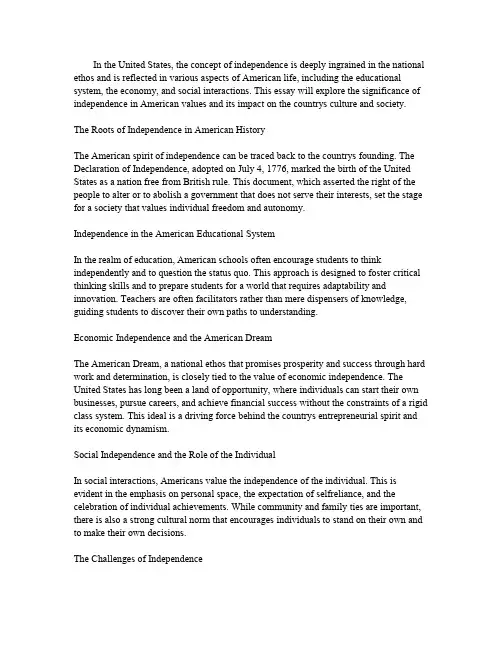
In the United States,the concept of independence is deeply ingrained in the national ethos and is reflected in various aspects of American life,including the educational system,the economy,and social interactions.This essay will explore the significance of independence in American values and its impact on the countrys culture and society.The Roots of Independence in American HistoryThe American spirit of independence can be traced back to the countrys founding.The Declaration of Independence,adopted on July4,1776,marked the birth of the United States as a nation free from British rule.This document,which asserted the right of the people to alter or to abolish a government that does not serve their interests,set the stage for a society that values individual freedom and autonomy.Independence in the American Educational SystemIn the realm of education,American schools often encourage students to think independently and to question the status quo.This approach is designed to foster critical thinking skills and to prepare students for a world that requires adaptability and innovation.Teachers are often facilitators rather than mere dispensers of knowledge, guiding students to discover their own paths to understanding.Economic Independence and the American DreamThe American Dream,a national ethos that promises prosperity and success through hard work and determination,is closely tied to the value of economic independence.The United States has long been a land of opportunity,where individuals can start their own businesses,pursue careers,and achieve financial success without the constraints of a rigid class system.This ideal is a driving force behind the countrys entrepreneurial spirit and its economic dynamism.Social Independence and the Role of the IndividualIn social interactions,Americans value the independence of the individual.This is evident in the emphasis on personal space,the expectation of selfreliance,and the celebration of individual achievements.While community and family ties are important, there is also a strong cultural norm that encourages individuals to stand on their own and to make their own decisions.The Challenges of IndependenceHowever,the pursuit of independence is not without its challenges.The emphasis on individualism can sometimes lead to a lack of community cohesion and a sense of isolation.Additionally,the pressure to be selfsufficient can be overwhelming,particularly for those who face economic hardship or who struggle with mental health issues. ConclusionIn conclusion,the value of independence is a cornerstone of American culture,shaping the nations educational practices,economic aspirations,and social interactions.While it offers many benefits,such as fostering creativity and personal growth,it also presents challenges that society must address to ensure that the pursuit of individual freedom does not come at the expense of community and collective wellbeing.The balance between individual independence and social interdependence is a dynamic and ongoing conversation in American society.。
摘自:英语泛读教程The following is part of an essay taken from Bradford Smith's book, Why We Behave Like Americans. Success as a goal and materialism, according to Smith, are among the underlying factors that make up the American character.以下节选自布拉德福德所著《为什么我们的举止象美国人》里的一篇文章。
据布拉德福德所说,目标为成功和物质享乐主义,构成美国人性格的内在因素。
When visitors from abroad undertake to describe the American Character, the results are frequently puzzling to Americans. "All Americans are Puritans; that's what's wrong with them," says one. "They're always thinking about enjoying themselves," says another. "They spend too much time at work," a distinguished visitor tells us. "They don't know how to play." "Americans don't know what work is, " retorts another." Their machines do it all." "American women are shameless sirens." -"No, they're prudes." "The children here are wonderful -outgoing and natural." -"Natural as little beasts. They have no manners, no respect for their elders."要是让国外来客描述美国人的性格,结果常常令美国人感到奇怪。
American valuesI want to talk about equal chance-based opportunity to start from scratch and achieve success through fair competition.Equality of opportunity and competition is one of the basic American values. Americans believe in the ideal, as stated in their Declaration of Independence, that "all men are created equal". Although they sometimes violate the ideal in their daily lives, Americans have a deep faith that in some fundamental way all people are of equal value, that no one is born superior to anyone else. They have felt that because individuals are free from excessive political, religious, and social controls, they have a better chance for success. Particularly important is the lack of the hereditary aristocracy,It is important to understand what Americans mean when they say they believe in equality of opportunity. They do not mean that everyone should be totally equal. However, they do mean that each individual should have an equal chance for success. American thinks highly of the persons who gain success by their hardworking, instead of relying on the family. In America, you can often see the person who is in low profile, while he (or she) is a relative of a successful person.。
美国价值观与观念随着们的成长,他们从他们的父母和其他亲戚,他们的老师,书籍,报纸,电视节目,互联网,以及各种其他来源学习某些价值和假设。
价值观和假设是紧密相关的,但它们之间存在着一定的差异。
在不同文化的方法中,男人和女人的角色的适当的角色提供了一个很好的例子,价值观和假设之间的关系。
价值观是对什么是正确和错误,可取和不可取的,正常和不正常,适当和不适当的想法。
例如,在某些文化中,人们教导人们应该在不同的社会世界中单独的社会世界,在男人的领域中有明确的活动,在其他文化中,男人和女人都被认为有更多或更少的平等参与社会中的角色。
观念,用在这里,是观念,是关于人的,生活的给予,,而事情的方式。
例如,在某些社会中,人们认为家庭生活是和谐的,当女人在家里和孩子们呆在家里时,他们会在家里赚钱。
在其他社会,人们认为家庭生活是最好的,当外界工作和抚养孩子的责任是由男人和女人共同分享的。
在一些社会中,人们认为当一个成熟的男人和女人单独在一起,性活动几乎肯定会发生。
在其他国家,柏拉图(即,性元素缺乏)未婚男女之间的友谊是可能的。
学者争论的定义,价值观,假设,和其他条款,出现在这本书。
但这本书不是为学者。
希望对美国有一定了解的国际游客。
那些想读更多学术著作的人在这里提出的问题可以参考书目的最后这本书。
在特定的文化中成长的人有一定的价值观和假设。
这并不意味着他们都在相同的程度上分享相同的价值观。
这确实意味着他们中的大多数,大部分时间,都同意对方的想法,对什么是正确的和错误的,可取的和不可取的,等等。
他们也同意,主要是,与彼此的假设有关的人性,社会关系,等等。
任何价值观和假设的任何一列都是天生的武断的。
这取决于如何定义和分类的东西,可以使一三项或一三零项国家的重大价值和假设清单。
摘自:英语泛读教程The following is part of an essay taken from Bradford Smith's book, Why We Behave Like Americans. Success as a goal and materialism, according to Smith, are among the underlying factors that make up the American character. 以下节选自布拉德福德所着为什么我们的举止象美国人里的一篇文章;据布拉德福德所说,目标为成功和物质享乐主义,构成美国人性格的内在因素;When visitors from abroad undertake to describe the American Character, the results are frequently puzzling to Americans. "All Americans are Puritans; that's what's wrong with them," says one. "They're always thinking about enjoying themselves," says another. "They spend too much time at work," a distinguished visitor tells us. "They don't know how to play." "Americans don't know what work is, " retorts another." Their machines do it all." "American women are shameless sirens." - "No, they're prudes." "The children here are wonderful - outgoing and natural." -"Natural as little beasts. They have no manners, no respect for their elders."要是让国外来客描述美国人的性格,结果常常令美国人感到奇怪;一个人说:“所有的美国人都是清教徒;所以他们与众不同;”另一个人说:“他们总是想方设法让自己开心;”一位尊贵的客人告诉我们:“他们花在工作上的时间太多;他们不懂如何玩乐;”另一个人反驳说:“他们不懂什么是工作;因为机器替他们做了一切;”“美国女人是不知廉耻的,妖艳而危险的女人;”--“不,她们假正经;”“这里的孩子真好--外向,自然;”----“象小小的野兽一样自然;他们没礼貌,不尊敬长辈;”There is, of course, no single pattern of American character any more than there is a single English or Turkish or Chinese character. Personality in America is further complicated by our diverse racial and cultural origins, by successive waves of immigration from all parts of the world, by our regional diversities. It is complicated by several hundred varieties of religious belief with their varying impact on the believers. It is further diversified by the generation to which the person belongs -first generation immigrant, second generation child of immigrants, and on down the line.当然,世上既没有单一模式的美国人性格,也没有单一的英国人性格或土耳其人性格或是中国人性格;个性的定义在美国变得更为复杂,因为我们有不同的种族和文化背景,因为来自世界各地连续不断的移民浪潮,因为我们区域的多样性;个性的定义变得复杂,因为几百种不同的宗教信仰及其对各自的信奉者的影响不同;个性的定义也由于每个人所处的年代不同而趋多样化--第一代是移民,第二代是移民的孩子,一直照此延续下去;The temptation is strong to lump all Americans together. Yet those who look a little deeper are puzzled by the seeming contradictions in American life. It is true that Americans as a whole work hard. But they also play hard. They spend more time and money in traveling, camping, hunting, watching sports, drinking, smoking, going to movies, watching television and reading newspapers and magazines than any other people in the world. Yet they also spend more money on churches, social services, hospitals and all kinds of charities. They are always in a hurry, yet they spend more time relaxing. They are at the same time sensitive to the rights of the individual and habitual conformist. They worship bigness yet idealize the little man, whether he be the small business man as opposed to the big one or the plain citizen as opposed to the big wheel.强大的吸引力把众多的美国人聚集在了一起;然而那些想再了解深入一点的人弄不懂美国人生活中各种似乎自相矛盾的东西;的确,美国人总体上工作努力;但他们也拼命地玩;他们去旅游、露营、打猎、看体育比赛、喝酒、抽烟、看电影电视、读报纸杂志,花的时间和金钱比世界任何地方的人都多;而他们还把更多的时间花在教会、社会服务、医院和各种各样的慈善活动上;他们总是忙来忙去,又总是花更多的时间休闲;他们十分在乎个人的权利,又习惯于墨守陈规;他们崇拜大人物,也把小人物理想化 ,不论他是和大商人形成对照的小商人,还是和大权在握的人形成对照的平民百姓;Success as a Goal 成功作为目标One thing almost everyone is agreed on, including Americans, is that they place a very high valuation upon success. Success does not necessarily mean material rewards, but recognition of some sort - preferably measurable. If the boy turns out to be a preacher instead of a business man, that's all right. But the bigger his church and congregation, the more successful he is judged to be.包括美国人在内几乎每一个人都会赞同的一点是,美国人极为看重成功;成功不一定是物质上的回报,而是得到某种认可, 最好是可以衡量的那种;如果一个男孩后来没有从商,而是做了布道的教士,那也没什么;但是他的教堂规模越大,教堂会众越多,别人就认为他越成功;A good many things contributed to this accent on success. There was the Puritan belief in the virtue of work, both for its own sake and because the rewards it brought were regarded as signs of God's love. There was the richness of opportunity in a land waiting to be settled. There was the lack of a settled society with fixed ranks and classes, so that a man was certain to rise through achievement.好多事情都说明,成功是美国人生活的重点;清教徒相信工作带来的好处,既有工作本身的乐趣,还因为工作的回报是上帝之爱的体现;一片富饶的土地到处都是机遇,等待着人们到来;在一个不固守陈规的社会,没有严格的等级和阶级,这样人就一定能通过成功提升自己的社会地位;There was the determination of the immigrant to gain in the new world what had been denied to him in the old, and the part of his children an urge to throw off the immigrant onus by still more success and still more rise in a fluid, classless society. Brothers did not compete within the family for the favor of the parents as in Europe, but strove for success in the outer world, along paths of their own choosing.凡是旧的世界拒绝给的,移民决心都要在新的世界得到;对于他的后代而言,要摆脱作为移民的负担,只有在一个灵活自由的无阶级社会里取得更多的成功,升至更高的地位;他们的兄弟之间不象欧洲人那样为获得父母的欢心而相互倾轧,他们都在外面的世界沿着各自选择的道路为成功而奋力拚搏;The English anthropologist, Geoffrey Gorer, sees the whole situation in Freudian terms. Europe is the father rejected by every immigrant who turned his back on his own culture in order to make a new life in America. The immigrant's struggle for success never ends, because there is no limit to the possible goal. The second generation child, in turn, rejects the alienparents because they cannot measure up to American standards. The only way he can soften the blow is to achieve a still greater success. All over America the lawyers, doctors, professors and politicians with Italian, Irish, German or Polish names testify to the urgency of this drive.英国的人类学家杰弗里·戈罗尔用弗罗伊德的说法来解释这一切;欧洲是被所有的移民抛弃的父亲,移民为了在美国过上新生活,背离了自己的文化;移民为了要成功从未停止过奋斗,因为目标的内容没有限制;同样,第二代移民拒绝接受移民过来的父母,因为后者无法适应美国标准;他能减轻压力的唯一方式 ,就是取得更大的成功;在整个美国,有意大利人、爱尔兰人、德国人或波兰人名字的律师、医生、教授和政治家,都能证明这种成功欲望的强烈;Not to strive, not to take advantage of the opportunities in such a world, not to succeed where success was so available - these things naturally became a sort of crime against the state. To develop the resources of a new country required energetic people, bent upon using their energies -not only for the rewards that would result to themselves, but even more important, to the community. So material success in the United States is not looked upon as selfish. Its results are seen to have communal value. 要是不奋斗,不利用这个世界的各种机会去成功而不能成功---这些无疑都是对国家的一种犯罪;开发一个新国家的各种资源,需要精力充沛的人不遗余力地发挥他们的充沛精力---不仅仅是为了他们会得到的回报,更重要的是给社会带来的回报;所以在美国,没有人把物质上的成功看成是自私的;成功的果实被看作具有全民共享的价值 ;Ford, Carnegie, Rockefeller built great fortunes for themselves. But they also built an economy which has brought a great deal of material well-being, higher health standards and better educational opportunities to millions of Americans. This is how it looks to us, anyway, from inside.福特、卡耐基、洛克菲勒,都为自己创造了极大的财富;但他们也建立起一种经济,既可以带来许多物质上的幸福,更高的健康水平,也可以给上千万的美国人创造更好地受教育的机会;无论怎样,这就是成功的内涵;A society which values competition so highly is inevitably an aggressive one, even though the laws carefully limit the forms aggression may take. It has a toughness about it which is good for the muscle tone of the economy but hard on some individuals. In our pioneering days this aggressiveness was essential to survival. Now it can be a menace to society. The factory worker who reaches a dead end and sees himself stuck in the same job year after year may take out his aggressive feelings in race hatred or fighting management, or he may even turn it against himself by way of alcoholism, proneness to accident, or neurotic behavior.一个如此注重竞争的社会必定是攻击性的社会,尽管法律严格限制各种攻击形式;这种对攻击的严格限制对完善经济的肌体有益,但对某些个人却过于严格;在拓荒时代,这种攻击性是生存所必需的,但现在可能是一种对社会的威胁;走投无路、常年被同一工作所困的工人可能会将这样的攻击性用于种族仇恨或反对管理,或开始酗酒、滋事、神经质、和自己过不去;Since a high regard is felt for success, the rewards are high. Money is rarely cherished for itself in America; it is rather a symbol and a tool. As a man's status rises, the demands upon him also increase. He is expected to give liberally to the hundreds of voluntary associations which nourish and minister to the community. Look at the Who's Who entry for any prominent business man, and you are likely to find him involved in an amazing number of committees and associations organized for the public good.既然高度注重成功,回报也就很高;在美国,人们很少看重金钱本身,它更多的是一种标志,一种工具;当一个人的地位提高,人们对他的要求也相应提高;成百上千各种各样的志愿者协会有益于社会并服务于社会,人们期望他能慷慨捐钱给这些协会;你去看看名人录,随便找一个知名商人的条目,就会发现他参加的公益性委员会和协会多得令人吃惊;This striving for success and prestige, according to psychologists, is a way of overcoming fears and a sense of inner emptiness. In a mobile societyan energetic person can hardly help matching himself against others and seeing how far he can go.这种为成功和名望而奋斗的心理,按心理学家的说法,是一种克服恐惧和内心空虚感的方式;在一个时刻变化着的社会,一个有进取精神的人难免会拿自己与别人相比,知道自己能达到的目标是什么;Such a system is fine for those who have it in them to succeed. It is not so good for the mediocre. The fear of failure, the fear of competitors, the loss of self esteem - these arouse tensions that some people cannot handle. In their turn they produce an excessive craving for love. So love and success are linked. Gorer believes that most Americans by the time they are adolescents have confused two ideas: to be successful is to be loved, and to be loved is to be successful. Mothers help to impose the pattern by showing affection and admiration when their children do well at school and by withholding affection when they fail.这种思维方式对于那些本来就这样想的人是有利的;但对不求上进的人却没什么好处;害怕失败,害怕竞争对手,丧失自尊---都导致了一些人无力应付的紧张情绪;然后,这种紧张情绪就产生了对爱的极度渴望;因此爱和成功是密不可分的;戈罗尔认为 ,许多美国人在少年时期就被两个问题困扰:成功就是要得到爱,要得到爱就要成功;母亲们把这个模式成功地灌输给孩子:孩子们在学校里表现好,她们就对他们显示出无限的疼爱和喜爱;孩子们要是做得不好,她们就拒绝给予关爱;Since there are no limits of class, inherited occupation or education to hold a child back, there are, in theory, no limits to what he can achieve. Consequently there is no point at which he can say: " There, I've done it. From now on all I have to do is to hold on." Since any boy can, in theory, become President, striving is a moral obligation. Achievement, not class, is the standard by which men are judged. There is little or no glory attached to being born wealthy or privileged; the real test is how far you climb from where you started.既然没有阶级限制、世袭职业或教育来阻碍孩子的发展,所以从理论上说,他所能取得的成就也没有限制;如果他说:“哦,我已经做到了;从现在起我要做的就是继续保持,”这样的话毫无意义;因为,理论上,任何孩子都可以做总统,奋斗是一种道德上的义务;评价人的标准是成功而不是阶级;不论出身豪门还是出身显赫,都没有什么可炫耀的;真正的考验就是:从你的起点你能爬多高;Americans love work. It is meat and drink to them. In recent years they have learned how to play, but they make work of that too. If it's skiing, they throw themselves at it with an effort that would kill a horse. If it's a vacation, they travel five or six hundred miles a day, take in the sights at sixty miles an hour, pause only long enough to snap pictures, and then discover what it was they went to see when they get home and look at thephotographs.美国人热爱工作;工作就是他们的命根子;近年来他们已经学会玩,但是将玩也当成了工作;要是去滑雪, 他们就在雪地上猛冲,那样子连马都会累死;如果去度假,他们就每天开车五六百公里,以每小时60英里的速度观光,沿途只停下来拍些快照;然后 ,发现了自己要看的东西是怎么一回事,就打道回府,回去看照片;Until very recently there has always been a great deal of work to do in this country, a great deal that needed doing. At the beginning men of all sorts and conditions had to pitch in. The preacher had to fell trees and plough fields. The teacher, the doctor and the magistrate had to shoulder guns for the common defense. The farmer made his own tools, harness, household equipment. He was blacksmith, carpenter, tinsmith, brewer and veterinary all rolled into one, as his wife was spinster, weaver and doctor. 直到最近,这个国家还总是有许多事要做,还有许多事情必须要做;以前不管什么人都工作得很辛苦;传教士要伐树、犁田;教师、医生 ,还有地方法官得扛着枪当民兵;农场主自己动手做工具、马鞍和家用器具;他集铁匠、木匠、白铁匠、啤酒酿造者和兽医于一身;他的妻子既是纺纱工、织布工,又是医生;Americans still like to be handy at all things. College professors go in for making furniture or remodeling an old house in the country. Bankersdon aprons and become expert barbecue chefs. Nearly everyone knows how to use tools, make simple repairs to plumbing or electrical fixtures, refinish furniture or paint a wall. Far from being thought a disgrace if he performs these "menial" tasks, a man is thought ridiculous if he does not know how to perform them.美国人仍然喜欢什么都学着做;大学教授喜欢做家具或是改造乡下的老房子; 银行家穿上围裙,就成了专业的烧烤厨师;几乎每一个人都懂得使用工具,懂得简单的下水道或电力装置的修理,还会修家具,刷墙;做这些“粗活”绝不会让人认为不体面,不会做才是让人觉得不可思议呢;Along with this urge to be jack-of-all-trades goes a willingness to change from one occupation to another. It surprises no one in America when the banker's son becomes a farmer or vice versa. Or when a college professor shifts into industry, or a young man who starts out with a truck purchased on credit ends up running an enterprise with fleets of trucks spanning several states. President Truman was a farmer, an operator of a haberdashery and an army officer before he turned to law and politics. James Bryant Conant, first a chemist, then President of Harvard University, resigned this highest post in the academic world to become High Commissioner and then Ambassador to Germany.与这种成为万事通愿望并存的是变换职业的愿望;在美国,不管是银行家的儿子当了农场主还是农场主的儿子做了银行家,都不会让人吃惊;更不用说大学教授转行干上了实业; 一个年轻人靠一辆贷款买来的卡车起家,后来当上了公司的老板,拥有卡车车队,行驶在好几个州;杜鲁门总统经营过农场,开过男装店,当过陆军军官,后来才转学法律和政治;詹姆斯·布莱恩特·克兰特原先是化学家,后来担任哈佛大学的校长,辞去了这个学术界的最高职位后担任了高级公共事务官员,后被任命为驻德大使;"For a European," writes Andre Maurois, "life is a career; for an American, it is a succession of hazards."安德鲁·莫里斯写道“对于欧洲人来说,生活是生命的历程,而对于美国人,生活就是一个接一个的危险;”A single individual can be at once an intellectual, a Boy Scout leader, a business man, a sportsman, a dabbler in music or painting, a nature-lover, and one who does many of his own household chores. An employer, he may go hunting with his own or someone else's employees. A shopkeeper, he may run for local office and be on familiar terms with professional men and government officials. He will live on several levels which in other countries might be separated by class distinctions.一个人可以同时是知识分子,童子军首领,商人,运动健将,音乐绘画的爱好者,热爱大自然的人,做大部分家务的人;当老板的也许会和自己的或别人的雇员一起打猎;经营商店的可能会竞选当地的政府职位, 熟悉专业人士和政府官员;他可以同时位于别的国家也许会用等级的概念来划分的不同社会阶层;The emphasis on success and achievement, coupled as it is with a desire to be loved and admired, leads to a critical dilemma of personality. To succeed one must be aggressive; to be liked, one must be easy-going and friendly.强调成功和成就,再加上要得到爱和赞赏的强烈愿望,会导致个性发展的两难境地:要成功,人就必须好斗;要别人喜欢自己,人就得宽容、友好;One way out of the difficulty is to acquire groups of friends - lodge brothers, members of the same church, a veteran's organization - towards whom you are pledged in friendship. Having thus acquired assured friends, you can practice your aggression on those who don't belong. This pattern explains to some extent the suspicion or hostility towards those of other races or religions.走出困境的一个办法就是有成群的朋友---会社支部的会员,同一教堂的成员,退伍军人组织---他们一定会给你友谊;有了这些可以信赖的朋友,你就可以对那些不在朋友之列的人表现出你的攻击力;这种模式也或多或少地解释了 ,为什么会对其他的种族或教会的人持怀疑敌视的态度;Materialism 物质享乐主义The men and women who staked everything on America were for the most part poor. They struggled hard, went without, and saved in order to build up a business or buy a farm of their own. The freedom to own rather than the freedom to vote was the magnet that drew the majority of them across oceans. Naturally enough they put a high value upon the land or the business they acquired through their own efforts.把赌注都押在美国的男男女女绝大多数是穷人;他们努力挣扎,忍气吞声,努力存钱,目的就是做点买卖,买个属于自己的农场;像磁铁一般吸引着他们大多数人远涉重洋的,是拥有财产的自由而不是投票的自由;所以他们很看重靠自己的努力得来的土地和做的买卖;In contrast with this natural acquisitiveness of the new arrivals, the American attitude toward money is quite different. As the German psychologist Hugo Munsterberg observed, the American "prizes the gold he gets primarily as an indication of his ability.... It is, therefore, fundamentally false to stigmatize the American as a materialist, and todeny his idealism.... The American merchant works for money in exactly the sense that a great painter works for money -" as a mark of appreciation for his work.和初来者自然的获取思想相比,美国人对钱的态度是很不一样的;就象德国心理学家休格·爱斯特伯格所指出的,美国人“很看重他挖到的金子 ,主要是因为金子是他的能力的体现……因此把美国人定义为物质享乐主义者而否认他的理想主义,从根本上就是错误的……美国的商人为钱工作,伟大的画家为钱绘画, 意义是完全一样的——”,都是是对自己的工作欣赏的标志;The acquisition of money is important as the clearest proof of success, though there are other acceptable proofs - prominence, public notice, good works, fame. But the retention of money is not important at all. Indeed, it may be frowned upon if it keeps the owner from living well, subscribing generously to a long list of charities, and providing for members of the family who may have been less fortunate.获得金钱是重要的,因为钱最能证明成功;当然还有人们可以接受的其他的证明---卓越,公众瞩目, 工作优秀,名声,等等; 但是存钱并不重要;事实上,钱的主人留着钱,不过好日子,不慷慨地捐款给大串的慈善机构,不接济家里没钱的人,人们也会不喜欢;So the materialism that strikes a visitor to America is not that of loving and hoarding wealth; it is a love of making and consuming wealth. It is probably a middle-class rather than a distinctively American phenomenon, for most Americans are middle-class.所以,到美国的人感到震惊的不是物质享乐主义的爱财和守财,而是美国人的既喜欢赚钱又喜欢花钱;这可能不是美国人特有的性格,而是中产阶级才有的现象,因为大多数美国人都是中产阶级;America has been blessed with a rich supply of raw materials. It learned during the depression that even a rich country can become impoverished if it fails to use its wealth to benefit the majority. And it does not propose to make that error again. A sizable portion of what it produces goes overseas, including agricultural and industrial machinery sent with the hope that standards of production and consumption can be raised in other parts of the world too.上天赋予美国丰富的自然资源;但在大萧条时期美国人懂得了,如果一个国家不把财富造福社会,再富有也会遭受贫困;它再也不会重蹈覆辙;美国生产的产品相当一部分到了国外,其中有工农业用的机械设备,就是希望世界其他地方的生产水平和消费水平能得到提高;There is no denying the fact that the high level of production does lead to a high level of material comfort, and that Americans are mighty fond of having things that are new, shine, softly padded, conveniently arranged, efficient, and so far as may be, effortless. The bread comes already sliced so that the housewife need not exert herself to slice it. It used to be that when she put the bread in the toaster, she had to turn it once to toast both sides. Then came the toaster which did both sides at once, then the toaster which popped the toast out when it was done, so that she did not have to turn a handle to raise it. Soon, no doubt, there will be a toaster which butters the toast, cuts it in quarters, and puts it on a plate. Perhaps there is one even now.无法否认这样一个事实:高水平的生产一定会带来高水平的物质享受,所以美国人非常喜欢把东西做得新颖、光亮,有柔软的衬垫,使用起来方便,这样就可以不费气力;买回来的面包已经切好片,主妇就省得再切; 以前她把面包放进烤面包机,还要翻转一次面包,才能烤另一面;于是就有了可以同时烤两面的烤面包机,烤完了还会把烤的面包送出来;所以她不必转手柄就能拿到烤面包;过不久,肯定会有更新的烤面包机,可以把烤面包涂上黄油,切成四分之一块,然后放到盘子上;说不定现在就已经有这样的烤面包机了;Food comes ready-cooked and frozen, vegetables already washed. Floor wax must be self-polishing, pens write for years without having to be filled.Storm windows change to summer screens at a touch. Heat is thoroughly automatic, and air conditioning keeps the house equally comfortable in summer. Automation now promises to put a final end to all drudgery, even to building in the controls which will keep the machines from making mistakes.食物买的时候是煮熟的、冰冻的,蔬菜是已经洗干净的;地板蜡肯定是自动上光的,钢笔写上几年都不用上墨水;轻轻一按,防暴风雪的窗子就变成了夏天的屏幕;暖气是自动的,冷气使房子即使在夏天也一样舒适;自动化现在可以让人再也不用做单调乏味的工作,自动装置用在控制器中,机器再也不会出错;Why is it that, having created a world in which he could live without raising a hand or taking a step, the American habitually seeks ways of letting off steam His towns are full of bowling alleys, golf clubs, tennis courts, clubs, lodges, churches and associations into which he pours energy both physical and mental. The labor-saving gadgets, the love of comfort turn out to be ways of saving his time and energy for something else.美国人创造了一个不用举手投足就能过得舒舒服服的世界,为什么还是习惯于用各种方式放松自己呢他们住的地方到处都是保龄球馆,高尔夫俱乐部,网球场,俱乐部,房子,教堂,以及各种可以让他们全身心投入的协会;他们制造省时省力的小器具,喜欢舒适,就是为了节约时间和精力做其他的事情;。
As for values, my first thought about changes in America's values is that we are all much more materialistic than when I grew up, and making money seems so much more important to both individuals and to businesses. But I also think this is a value change that seems to be going on world wide, including China. Do you agree? Obviously I don't know what it is like in China, but the Chinese who live here have strong beliefs in both being well educated - and accumulating lots of wealth. And they tend to be very wealthy, at least in this part of the country. Lately the real estate market here has been booming, raising values, but the newspapers have all sorts of stories about how a lot of the buyers are wealthy Chinese buyers, both from here and from China. They are either buying here for investment reasons, or buying here to provide their children with homes. Frequently, they are paying all cash, which has not been that usual here, considering how expensive real estate is in this area.
The other change in American values, and I have no idea if this is happening in China, is our focus on children. Families seem to revolve around their children's needs, buying them lots of toys, clothes, etc., even if they do not have a lot of money. In fact, a few years back, I read a study that when families go to restaurants, 80%
of the time, the children choose the restaurant. When I was growing up, frequently the children didn't even go out to eat with their parents, and if they did, they were not asked which restaurant they wanted to go to. It's almost funny. I think there are both good and bad things with this change - children do seem to be more confident, but they also have more of a sense of entitlement.
The other thing that I think is a strong American value, but becoming less so, is raising our children to be independent. Now more children, as they become adults, choose to stay living at home longer and seem to be better friends with their parents, really enjoying their parents more, than previous generations. I think the Asian cultures stress less independence from families, and more staying close and responsible for each other. I bet more American elderly end up in nursing homes than Chinese elderly as a result, although I really don't know.。